Industrial Heat Pump Market Research, 2033
The global industrial heat pump market size was valued at $9.5 billion in 2023, and is projected to reach $19.3 billion by 2033, growing at a CAGR of 7.4% from 2024 to 2033. The rise in the adoption of heat recovery systems is significantly boosting the demand for industrial heat pumps. As industries strive to enhance energy efficiency, these systems provide a vital solution by capturing and reusing waste heat that would otherwise be lost. Industrial heat pumps, in turn, play a critical role in optimizing this process, reducing overall energy consumption and cutting operational costs, which further drives their adoption.
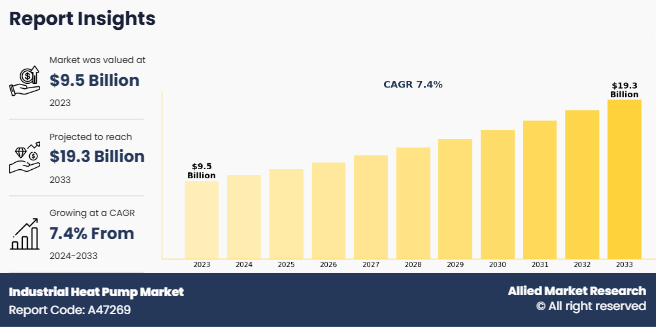
Introduction
An industrial heat pump is a system that extracts heat from a lower-temperature source (such as ambient air, water, or the ground) and transfers it to a higher-temperature destination, typically for use in industrial processes, heating systems, or hot water production. It works by circulating a refrigerant through a cycle of evaporation and condensation, during which it absorbs heat from the source and releases it at a higher temperature.
Key Takeaways
- The global industrial heat pump market has been analyzed in terms of value ($billion). The analysis in the report is provided on the basis of system type, source, capacity, end use, 4 major regions, and more than 15 countries.
- The global industrial heat pump market report includes a detailed study covering underlying factors influencing the industry opportunities and trends.
- The key players in the industrial heat pump market include STIEBEL ELTRON GmbH and Co. KG, Johnson Controls, Inc., Danfoss A/S, Robert Bosch, NIBE Industrier AB, Daikin Industries Ltd., Ingersoll-Rand Inc., Mitsubishi Electric Corporation, Carrier Global Corporation, and Emerson Electric Co.
- The report facilitates strategy planning and industry dynamics to enhance decision making for existing market players and new entrants entering the alternators industry.
- Countries such as China, the U.S., Canada, Germany, and Brazil hold a significant share in the global industrial heat pump market.
Market Dynamics
The increase in adoption of heat recovery systems is significantly driving the demand for industrial heat pumps. As industries continue to focus on improving energy efficiency and reducing operational costs, heat recovery systems have emerged as a crucial component in optimizing energy usage. Heat recovery systems capture and repurpose waste heat generated during various industrial processes, which would otherwise be lost. This repurposed heat then be used to meet heating needs or drive other processes, thereby reducing the reliance on external energy sources and lowering overall energy consumption. All these factors are expected to drive the growth of the global industrial heat pump market during the forecast period.
However, the high initial investment cost of industrial heat pumps remains a significant barrier to their widespread adoption. While these systems offer long-term energy savings and operational efficiency, the upfront financial outlay required for their installation and integration is substantial. This initial cost includes the purchase and installation of the equipment and potential modifications to existing infrastructure, which further escalate expenses. For many companies, particularly those with tight budgets or limited access to capital, this high initial investment poses a formidable challenge. All these factors hamper the global industrial heat pump market growth.
Technological innovations and product development are creating significant opportunities for the industrial heat pump market. Advances in technology are driving improvements in the efficiency, performance, and versatility of industrial heat pumps, making them more attractive to a broader range of applications and industries. For instance, the development of advanced compressor technologies, more efficient heat exchangers, and enhanced control systems are contributing to higher performance levels and reduced energy consumption. These innovations enhance the effectiveness of industrial heat pumps and lower the overall operating costs that makes them a more viable option for industries seeking to optimize their energy usage. All these factors are anticipated to offer new growth opportunities for the global industrial heat pump market.
Segments Overview
The industrial heat pump market is segmented into system type, source, capacity, end use, and region. On the basis of system type, market is divided into closed loop and open cycle. On the basis of source, the market is segmented into air, water, and ground. On the basis of capacity, the market is classified into less Than 500 kW, 500 kW to 2 MW, 2 MW - 5 MW, and more than 5 MW. On the basis of end use, the market is classified into Lumber drying, pulp and paper manufacturing, petroleum refining, food and beverages, chemical, utilities, district heating, and others. Region-wise, the market is analyzed across North America, Europe, Asia-Pacific, and LAMEA.
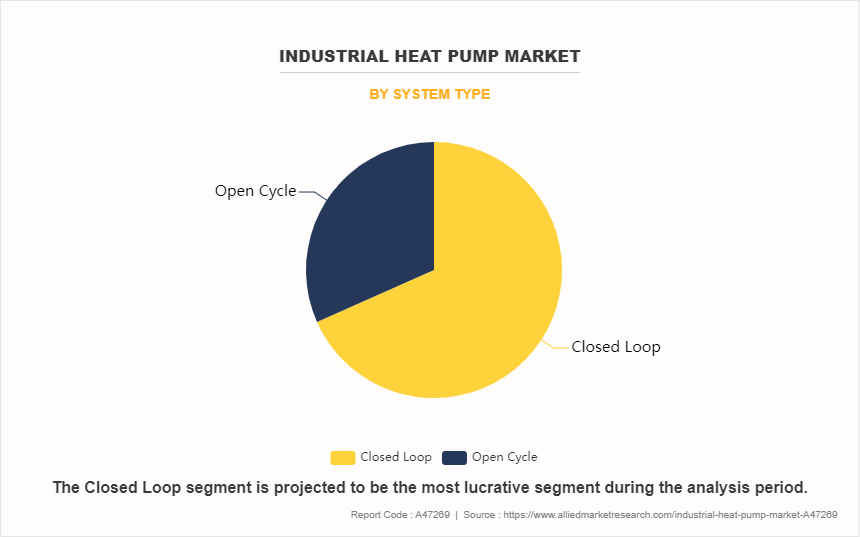
On the basis of system type, market is divided into closed loop and open cycle. The closed loop segment accounted for more than two-thirds of the industrial heat pump market share in 2023 and is expected to maintain its dominance during the forecast period. Closed-loop heat pumps are highly adaptable across various industrial applications. They are customized to meet the specific needs of different sectors, from high-temperature applications in petrochemicals to moderate heating needs in food and beverage processing. This versatility is a key factor driving their widespread use, especially as industries seek flexible solutions that is integrated into existing systems with minimal disruption.
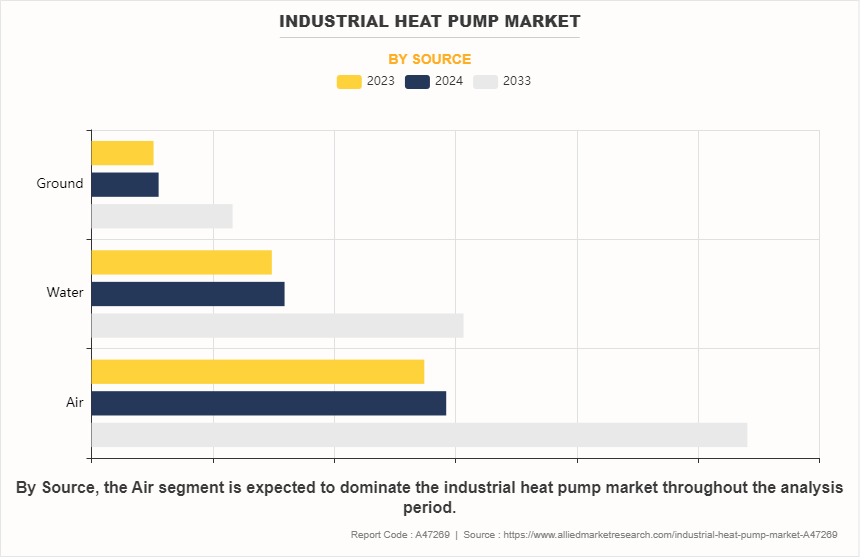
On the basis of source, the market is segmented into air, water, and ground. The air segment accounted for less than three-fifth of the industrial heat pump market share in 2023 and is expected to maintain its dominance during the forecast period. Stringent environmental regulations aimed at reducing greenhouse gas (GHG) emissions are another major factor driving the adoption of air source industrial heat pumps. Governments are enforcing stricter emissions standards and encouraging the transition to cleaner, renewable energy sources. Air source industrial heat pumps (ASHPs) use ambient air as their primary energy source, resulting in lower carbon emissions compared to fossil-fuel-based systems.
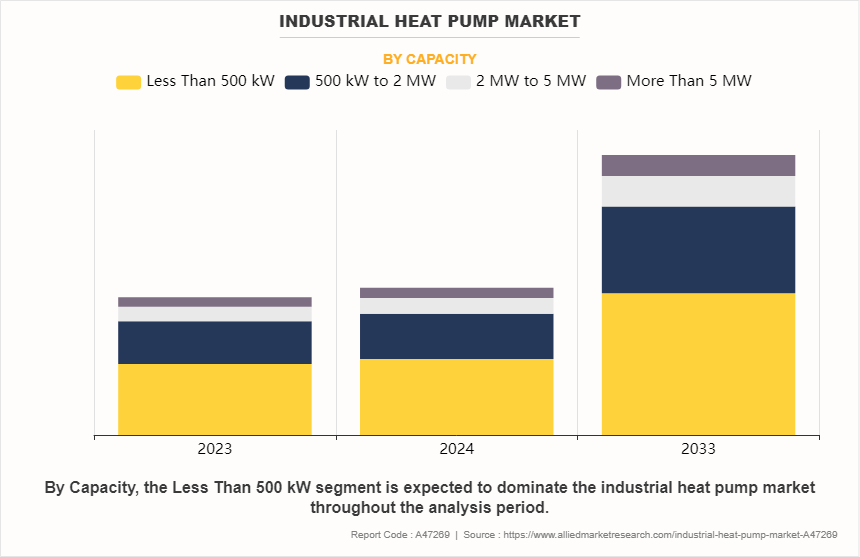
On the basis of capacity, the market is classified into less than 500 kW, 500 kW to 2 MW, 2 MW - 5 MW, and more than 5 MW. The less than 500 kW segment accounted for more than half of the industrial heat pump market share in 2023 and is expected to maintain its dominance during the forecast period. Small capacity heat pumps are particularly suited for applications in industries that require moderate heating or cooling solutions that make them ideal for sectors such as food processing, pharmaceuticals, and small-scale manufacturing. The growing emphasis on reducing energy consumption, particularly in countries with high energy costs, has significantly increased the adoption of these heat pumps in industrial settings. Their ability to deliver substantial energy savings over traditional heating systems is a major driver of market growth.
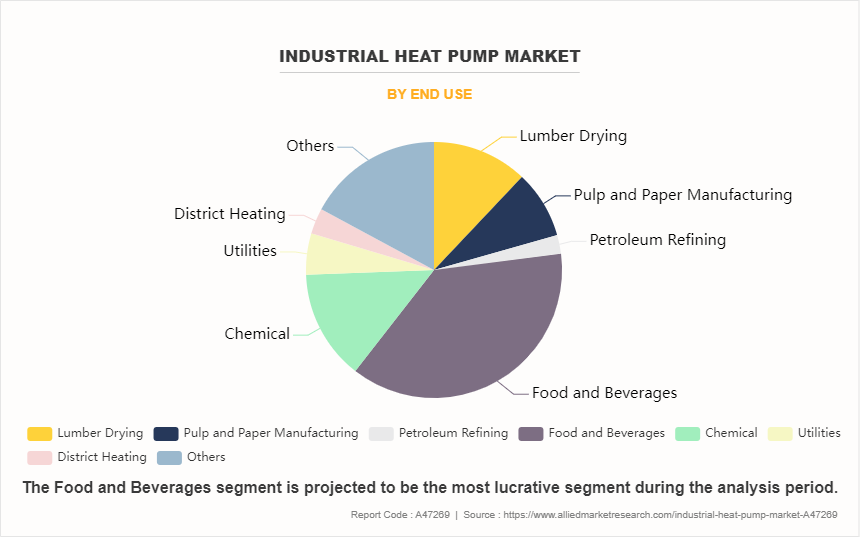
On the basis of end use, the market is classified into Lumber drying, pulp and paper manufacturing, petroleum refining, food and beverages, chemical, utilities, district heating, and others. The food and beverages segment accounted for less than two fifth of the industrial heat pump market share in 2023 and is expected to maintain its dominance during the forecast period. Rising energy costs play a significant role in the increasing adoption of heat pumps. The food and beverage industry operates on thin profit margins, and energy expenses account for a substantial portion of operational costs. Industrial heat pumps offer a long-term solution to this problem by reducing the reliance on fossil fuel-based heating systems and lowering overall energy consumption. As energy prices continue to rise globally, companies are turning to heat pumps to gain greater control over their energy expenses and enhance overall profitability.
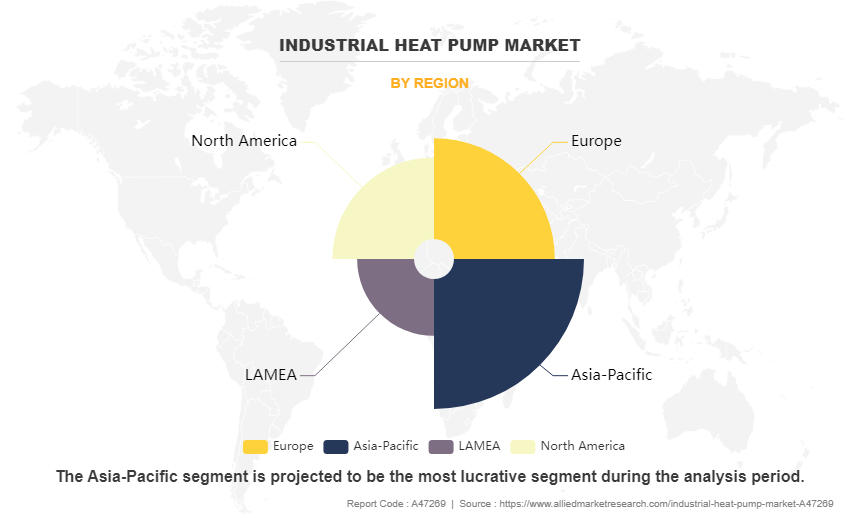
Region-wise, the market is analyzed across North America, Europe, Asia-Pacific, and LAMEA. The Asia-Pacific region accounted for more than one-third of the industrial heat pump market share in 2023 and is expected to maintain its dominance during the forecast period. Governments across the region are implementing stricter regulations to reduce carbon emissions and improve energy efficiency. Countries such as China and India have introduced policies promoting green technologies and are offering financial incentives for adopting energy-efficient systems. Industrial heat pumps, which significantly lower emissions and energy consumption, align well with these national goals of reducing environmental impact. The push for sustainability is particularly strong in industries that contribute heavily to emissions, such as petrochemicals and cement production.
Competitive Analysis
Key players in the industrial heat pump industry include STIEBEL ELTRON GmbH and Co. KG, Johnson Controls, Inc., Danfoss A/S, Robert Bosch, NIBE Industrier AB, Daikin Industries Ltd., Ingersoll-Rand Inc., Mitsubishi Electric Corporation, Carrier Global Corporation, and Emerson Electric Co.
Key Benefits for Stakeholders
- This report provides a quantitative analysis of the market segments, current trends, estimations, and dynamics of the industrial heat pump market analysis from 2023 to 2033 to identify the prevailing industrial heat pump market opportunities.
- The market research is offered along with information related to key drivers, restraints, and opportunities.
- Porter's five forces analysis highlights the potency of buyers and suppliers to enable stakeholders make profit-oriented business decisions and strengthen their supplier-buyer network.
- In-depth analysis of the industrial heat pump market forecast and segmentation assists to determine the prevailing market opportunities.
- Major countries in each region are mapped according to their revenue contribution to the global market.
- Market player positioning facilitates benchmarking and provides a clear understanding of the present position of the market players.
- The report includes the analysis of the regional as well as global industrial heat pump market trends, key players, market segments, application areas, and market growth strategies.
Industrial Heat Pump Market Report Highlights
| Aspects | Details |
| Market Size By 2033 | USD 19.3 billion |
| Growth Rate | CAGR of 7.4% |
| Forecast period | 2023 - 2033 |
| Report Pages | 419 |
| By System Type |
|
| By Source |
|
| By Capacity |
|
| By End Use |
|
| By Region |
|
| Key Market Players | Robert Bosch GmbH, Carrier Global Corporation, Danfoss A/S, DAIKIN INDUSTRIES, Ltd., Mitsubishi Electric Corporation, NIBE Industrier AB, STIEBEL ELTRON GmbH and Co. KG, Emerson Electric Co., Johnson Controls, Inc., Ingersoll Rand Inc. |
Analyst Review
According to the opinions of various CXOs of leading companies, the industrial heat pump market is expected to witness an increase in demand during the forecast period. Rise in adoption of heat recovery systems and increase in focus on decarbonization are expected to increase the demand for industrial heat pumps during the forecast period. Industrial heat pumps are highly efficient in capturing and reusing waste heat from various industrial processes that make them integral to heat recovery strategies. As industries become more focused on optimizing energy use and reducing costs, heat recovery systems provide an opportunity to recycle thermal energy that would otherwise be lost. By integrating heat pumps, industries transfer this recovered heat to other processes, such as space heating or process heating, significantly boosting overall energy efficiency. This demand is particularly evident in sectors such as pulp and paper, food and beverage, and petrochemicals, where substantial amounts of heat are generated during production.
Moreover, the growing focus on decarbonization is a key driver for the adoption of industrial heat pumps. As industries across the globe aim to reduce their carbon emissions and transition toward cleaner energy sources, heat pumps offer a promising solution. Industrial heat pumps use electricity to move heat rather than generate it through combustion that makes them a cleaner alternative to traditional fossil-fuel-based heating systems. Their ability to use renewable electricity further aligns with global decarbonization goals. Industries looking to minimize their carbon footprint are increasingly adopting industrial heat pumps to replace or supplement conventional heating systems, enabling them to achieve higher energy efficiency while reducing greenhouse gas emissions.
The global industrial heat pump market was valued at $9.5 billion in 2023, and is estimated to reach $19.3 billion by 2033, growing at a CAGR of 7.4% from 2024 to 2033.
Food and beverages is the leading application of Industrial Heat Pump Market.
Asia-Pacific is the largest regional market for Industrial Heat Pump.
Growing demand for process heating and cooling, Technological advancements are the upcoming trends of Industrial Heat Pump Market in the world.
STIEBEL ELTRON GmbH and Co. KG, Johnson Controls, Inc., Danfoss A/S, Robert Bosch, NIBE Industrier AB, Daikin Industries Ltd., Ingersoll-Rand Inc., Mitsubishi Electric Corporation, Carrier Global Corporation, and Emerson Electric Co are the top companies to hold the market share in Industrial Heat Pump.
Loading Table Of Content...
Loading Research Methodology...



